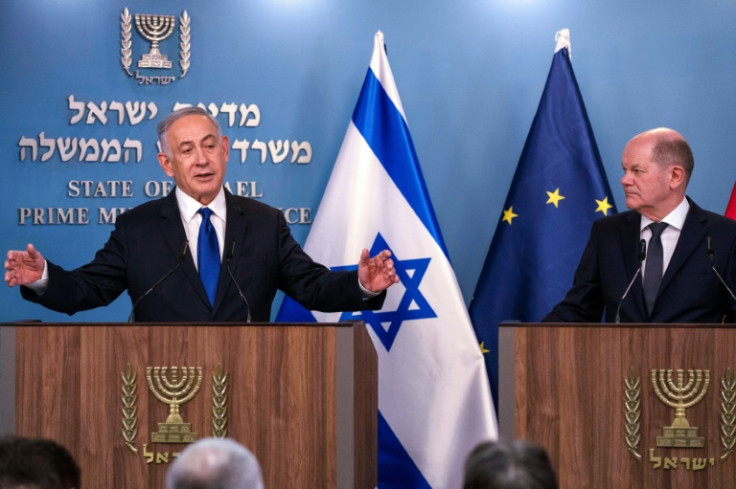Germany, Nicaragua Trade Barbs At Gaza Genocide Case

Nicaragua and Germany crossed swords at the UN's top court on Monday, with Managua saying Berlin was "pathetic" to supply aid to Gazans while also providing Israel with weapons, a case the top German lawyer dismissed as "grossly biased".
Nicaragua has hauled Germany before the International Court of Justice (ICJ) to demand judges impose emergency measures to stop Berlin from providing Israel with weapons and other assistance.
Lawyers for Nicaragua argued Germany is in breach of the 1948 United Nations Genocide Convention, set up in the wake of the Holocaust, by furnishing Israel with weapons.
"It is indeed a pathetic excuse to the Palestinian children, women and men to provide humanitarian aid, including through airdrops, on the one hand and to furnish the military equipment that is used to kill and annihilate them... on the other hand," Daniel Mueller, a lawyer for Nicaragua, told the court.
Nicaragua's ambassador to the Netherlands, Carlos Jose Arguello Gomez, told the court: "Germany seems not to be able to differentiate between self-defence and genocide."
Nicaragua asked the ICJ to decide "provisional measures" -- emergency orders imposed while the court considers the broader case.
"Germany was and is fully conscious of the risk that the arms it has furnished and continues to furnish to Israel" could be used to commit a genocide, said Alain Pellet, a lawyer for Nicaragua.
"It is extremely urgent that Germany finally suspend" such aid, he added.
Germany will respond fully in court on Tuesday but has already hit back at the allegations.
Its top lawyer, Tania von Uslar-Gleichen, said Nicaragua's case was "grossly biased".
"Germany completely rejects the accusations. We never did violate the Genocide Convention nor international humanitarian law either directly nor indirectly," she told reporters.
"On the contrary, Germany is committed to the upholding of international law and this is what we work for internationally."
The ICJ was set up to rule in disputes between nations and has become a key player in the war between Israel and Hamas militants that erupted after the October 7 attacks.
In a separate case, South Africa has accused Israel of perpetrating genocide in the Gaza Strip, charges Israel vehemently denies.
In that case, the court ordered Israel to do everything in its power to prevent genocidal acts and recently toughened its stance, ordering additional measures obliging Israel to step up access to humanitarian aid.
The court's rulings are binding but it lacks an enforcement mechanism. For example it has ordered Russia to stop its invasion of Ukraine, to no avail.
Nicaragua has requested five provisional measures, including that Germany "immediately suspend its aid to Israel, in particular its military assistance including military equipment".
It also calls on the court to order Germany to "reverse its decision to suspend the funding of UNRWA".
Germany said in January it was halting funding pending an investigation into Israeli accusations that several staff at the UN's agency for Palestinian refugees took part in the October 7 attack.
"This unjustified decision contributes to the suffering in Gaza where children women and men are starving," Mueller told the court.
Nicaragua said in its submission that "it could be comprehensible" that Germany would support an "appropriate reaction" by ally Israel to the October 7 Hamas attack.
"But this cannot be an excuse for acting in violation of international law," it said.
Mueller explained that Nicaragua was going after Germany instead of Israel's main ally, the United States, because Washington does not recognise the court's jurisdiction.
On Friday, German Foreign Minister Annalena Baerbock said Israel had "no more excuse" to delay aid getting into Gaza.
The bloodiest-ever Gaza war began after Hamas's October 7 attack in Israel, which resulted in the deaths of 1,170 Israelis and foreigners, most of them civilians, according to an AFP tally based on official Israeli figures.
Palestinian militants also took around 250 hostages, about 130 of whom remain in Gaza, including 34 the army says are dead.
In the past six months, Israel's retaliatory military offensive has killed at least 33,175 people, many of them women and children, according to the health ministry in Hamas-run Gaza.
The United Nations has warned of "catastrophic" hunger in the densely populated, besieged Palestinian territory.
© Copyright AFP 2025. All rights reserved.





















